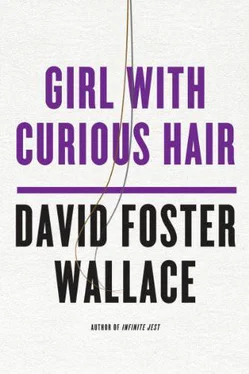David Wallace - Girl With Curious Hair
Здесь есть возможность читать онлайн «David Wallace - Girl With Curious Hair» весь текст электронной книги совершенно бесплатно (целиком полную версию без сокращений). В некоторых случаях можно слушать аудио, скачать через торрент в формате fb2 и присутствует краткое содержание. Год выпуска: 1996, Издательство: W. W. Norton & Company, Жанр: Современная проза, на английском языке. Описание произведения, (предисловие) а так же отзывы посетителей доступны на портале библиотеки ЛибКат.
- Название:Girl With Curious Hair
- Автор:
- Издательство:W. W. Norton & Company
- Жанр:
- Год:1996
- ISBN:нет данных
- Рейтинг книги:4 / 5. Голосов: 1
-
Избранное:Добавить в избранное
- Отзывы:
-
Ваша оценка:
- 80
- 1
- 2
- 3
- 4
- 5
Girl With Curious Hair: краткое содержание, описание и аннотация
Предлагаем к чтению аннотацию, описание, краткое содержание или предисловие (зависит от того, что написал сам автор книги «Girl With Curious Hair»). Если вы не нашли необходимую информацию о книге — напишите в комментариях, мы постараемся отыскать её.
). Girl with Curious Hair
Girl With Curious Hair — читать онлайн бесплатно полную книгу (весь текст) целиком
Ниже представлен текст книги, разбитый по страницам. Система сохранения места последней прочитанной страницы, позволяет с удобством читать онлайн бесплатно книгу «Girl With Curious Hair», без необходимости каждый раз заново искать на чём Вы остановились. Поставьте закладку, и сможете в любой момент перейти на страницу, на которой закончили чтение.
Интервал:
Закладка:
And I delivered mail. I emptied, thrice daily, gold-starred boxes, wire baskets, and dull-white sacks of mail into carts with canvas sides, trundled them over gray cellar stone into the freight elevator, and brought them up to Lyndon's maze of wooden offices and glass cubicles. I sorted mail in the sweet-smelling mimeo room. I got to know quickly what classes of mail there were and which went to whom for response. I got to know Lyndon's circle of assistants and researchers and aides and secretaries and public relations people, the whole upper-subordinate staff: Hal Ball, Dan Johnson, Walt Peltason, Jim Johnson, Coby Donagan, Lew N. Johnson, Dora Teane and her pool of typists — all pleasant, Southern, deeply tense, hardworking, dedicated to the constituency of Texas, the Democratic Party, and united in a complicated, simultaneous suspension of fear, hatred, contempt, awe, and fanatical loyalty to Lyndon Baines Johnson.
"Every night when I go to bed I ask myself: 'What did we do today that we can point to for generations to come, to say that we laid the foundations for a better and more peaceful and more prosperous and less-suffering world?'"
— Press Conference, Rose Garden
White House
April 21,1964
"Oh he could be a bastard. He had it in him to be a beast, and it was widely known. He'd hide paper-clips on the floor beneath his desk, to test the night custodian. He'd scream. One day he'd be as kind as you please and the next he'd be screaming and carrying on and cursing you and your whole family tree, in the most vile language, in front of your public co-workers. We became accustomed to this and all stopped, gradually we stopped being embarrassed by it, because it happened to all of us at one time or another. Except Mr. Boyd. We had a policy of trying to stay out of the Vice President's peripheral vision. He would go into rages for days at a time. But they were quiet rages. But oh that only made them more frightening. He prowled the offices the way a prowling storm will prowl. You never knew when it would hit, or where, or who. Rages, It was not a working environment I enjoyed, sir. We were all terrified much of the time. Except Mr. Boyd. Mr. Boyd, sir, never received an unkind public word from the Vice President from the first day he came to work when the Vice President was still a Senator. We believed that Mr. Boyd was a close relative at the time. But I wish to say Mr. Boyd never abused his position of immunity to the rages, however. Whether as a messenger all the way up to executive assistant, oh he worked as hard as we did, sir, and was as devoted to the Vice President as one man can be devoted to another. These are only the opinions of one typist, of course."
— Former typist in the office of LBJ
November, 1963
The truth made the truth's usual quick circuit around the offices, the Building, the Hill. I was a homosexual. I had been a homosexual at Yale. In my last year before matriculating to the Business College, I met and became intimate with a Yale undergraduate, Jeffrey, a wealthy boy from Houston, Texas, who was beautiful, often considerate, wistful, but passionate, possessive, and a sufferer from periodic bouts of clinical depression so severe he had to be medicated. It was the medication, I discovered, that made him wistful.
My lover Jeffrey ran with a group of synthetic but pleasant Texas socialites, one of whom was Margaret Childs, a tall, squarely built girl who eventually claimed, from unknown motive, to be in love with me. Margaret pursued me. I declined her in every sensitive way I knew. I simply had no interest. But Jeffrey grew inflamed. He revealed that his friends did not and must not know he was a homosexual. He pushed me to avoid Margaret altogether, which was hard: Margaret, gritty, bright enough to be chronically bored, had become puzzled, suspicious, of Jeffrey's (quite unsubtle) attempts to shield me from her. She smelled potential drama, and kept up the pursuit. Jeffrey became jealous as only the manic can. In my first year in Business, while I was shopping for my father's annual Christmas golf balls, Jeffrey and Margaret had it out, publicly, dramatically, in a Beat New Haven coffeehouse. Jeffrey put his foot through a doughnut counter. Certain information became public. Bits of this public information got back to my parents, who were close to the parents of two of my housemates. My parents came to me, personally, at Yale, on campus. It was snowing. At dinner with my parents and housemates, at Morty's, Jeffrey became so upset that he had to be taken to the men's room and calmed. My father swabbed Jeffrey's forehead with moist paper towels in a cold stall. Jeffrey kept telling my father what a kind man he was.
Before my parents left — their hands literally on the handles of the station wagon's doors — my father, in the snow, asked me whether my sexual preferences were outside my own control. He asked me whether, were I to meet the right woman, I might be capable of heterosexual love, of marriage and a family and a pillar-type position in the community of my choice. These, my father explained, were his and my mother's great and only wishes for me, their one child, whom they loved without judgment. My mother did not speak. I remember a distanced interest in the steam of my own breath as I explained why I thought I could not and so would not do as my father wished, invoking Fifties' wisdom about deviancy, invoking a sort of god of glands as a shaman might blame vegetable spirits for a lost harvest. My father nodded continually throughout this whole very serious and civil conversation while my mother checked maps in the glove compartment. When I failed to present for next week's holiday, my father sent me a card, my mother a check and leftovers in foil.
I saw them only once more before my father dropped dead of something unexpected. I had left Jeffrey's company, and had been befriended in my upset by a still grimly determined Margaret Childs. Jeffrey unfortunately saw, in all this, cause to take his own life, which he did in an especially nasty way; and he left, on the table beneath the heating pipes from which he was found suspended, a note — a document — neatly typed, full enough of absolute truth concatenated with utter fiction that I was asked by the administration of the Business College to leave Yale University. Weeks after my father's wake I married Margaret Childs, under a mesquite tree, the blue stares of my mother and a Houston sky, and a system of vows, promises of strength, denial, trial, and compassion far beyond the Childs' Baptist minister's ritual prescriptions.
The truth, to which there was really no more than that, and which made its way through the Senator's staff, the Dirksen and Owen Buildings, and the Little Congress of the Hill's three-piece-suited infantry remarkably focused and unexaggerated, concluded with the fact that Margaret's father, Mr. Childs, less wealthy than outright powerful by the standards of 1958's Texas, had lines of political influence that projected all the way into the U.S. Senate, and that he, Mr. Childs, in a gesture that was both carrot and stick, slung his son-in-law on one line of that influence and had me handover-hand it into the offices of a risen and rising, uncouth and ingenious senior Senator, a possible Democratic candidate in the next Presidential election. Lyndon.
I categorized and delivered mail. Business mail, official mail, important or letterheaded mail was all put into the hands of one or another of Lyndon's eight closest advisors and aides. Intra-Senate mail went to one of three administrative assistants.
All envelopes addressed by hand — automatically classified as letters from constituents — were doled out by Mrs. Teane and me among secretaries, interns, typists, low-level staffers. There was often far more of this constituents' mail, these Voices of the People, full of invective or adulation or petition for redress or advantage, far, far more than the low-level personnel could handle in a physical day. I developed and got approval for a few standardized replies, form letters made to look personal, responding to some one or another major and predictable theme in some of this mail, but we were still barely ahead of the Same Day Directive's demands. Backlogs threatened. I began staying at the offices late, telephoning Margaret or Peter to release me from the evening's plans, working to finish up assembling the Senator's replies to his people's every voice. I enjoyed the night's quiet in the staff room, one lamp burning, cicadas thrilling in rhythm out on the grounds. The staffers who handled mail began to appreciate me. A typist kept bringing me loaves of banana bread. Best, I now got access to Mrs. Teane's dark and deeply bitter East Texas coffee; she'd leave me a chuckling percolator of it as she made the closing rounds, plump and clucking, turning off lights and machines. I enjoyed the offices' night.
Читать дальшеИнтервал:
Закладка:
Похожие книги на «Girl With Curious Hair»
Представляем Вашему вниманию похожие книги на «Girl With Curious Hair» списком для выбора. Мы отобрали схожую по названию и смыслу литературу в надежде предоставить читателям больше вариантов отыскать новые, интересные, ещё непрочитанные произведения.
Обсуждение, отзывы о книге «Girl With Curious Hair» и просто собственные мнения читателей. Оставьте ваши комментарии, напишите, что Вы думаете о произведении, его смысле или главных героях. Укажите что конкретно понравилось, а что нет, и почему Вы так считаете.












